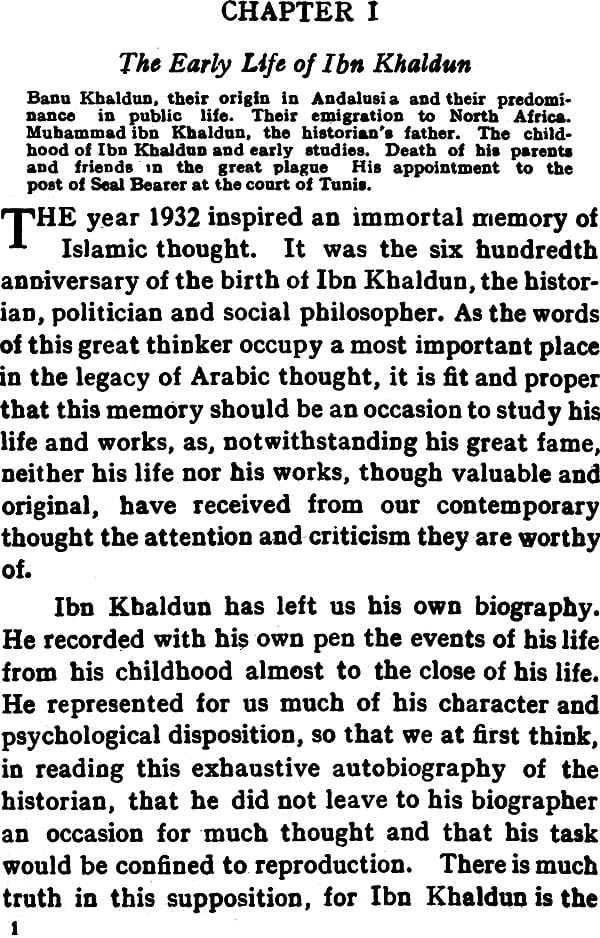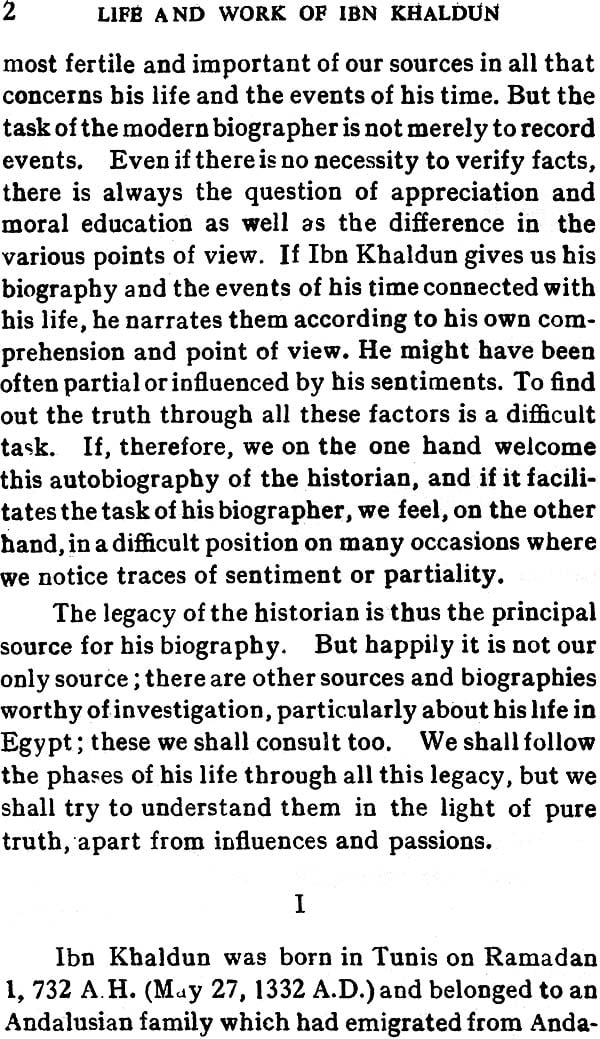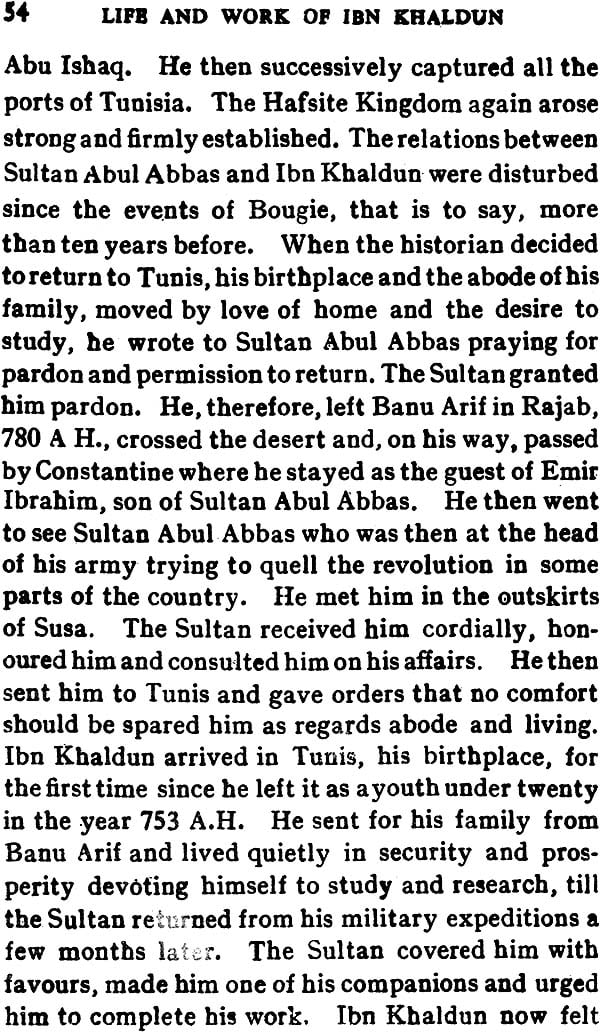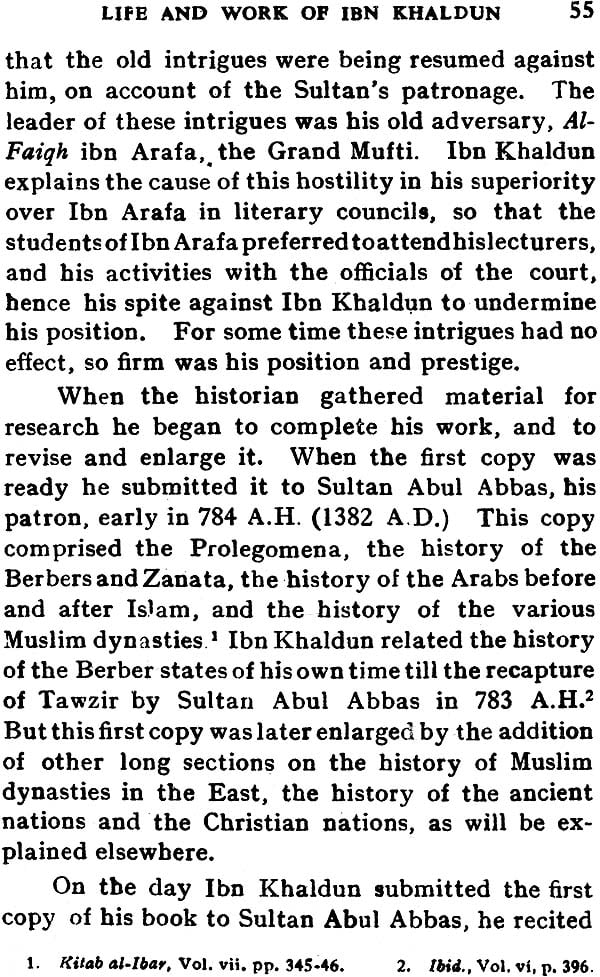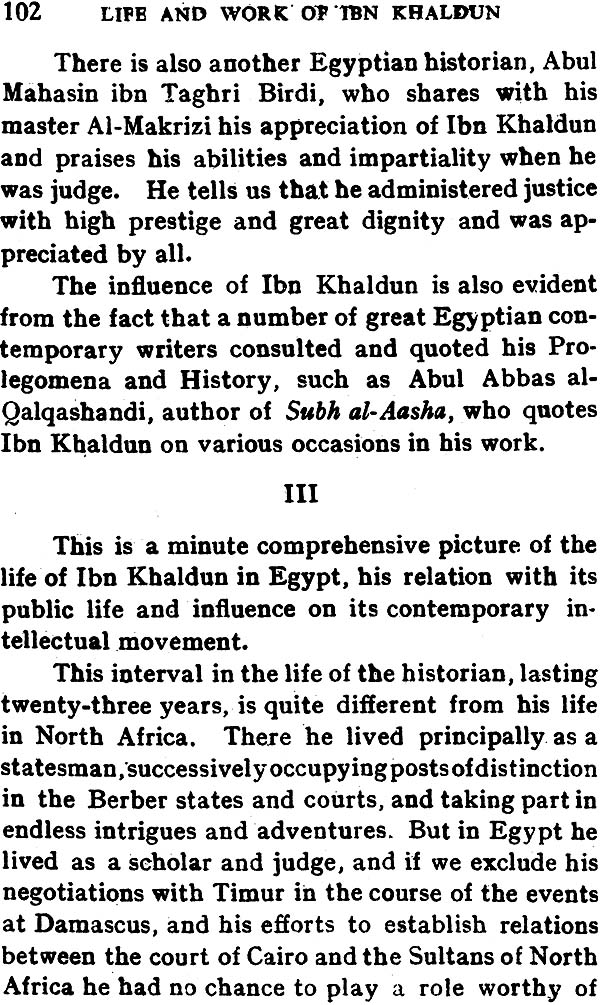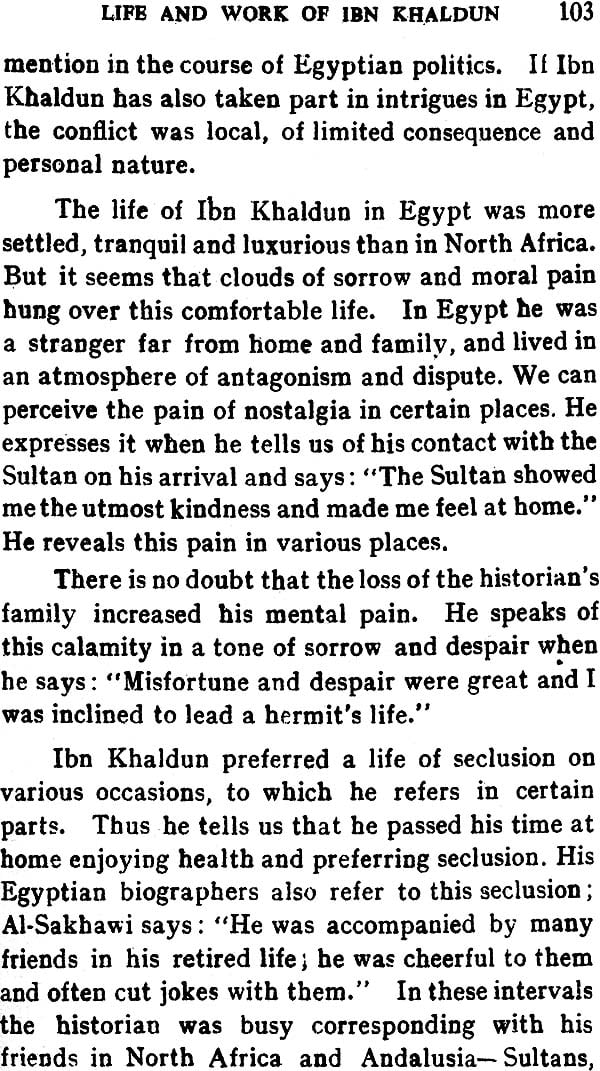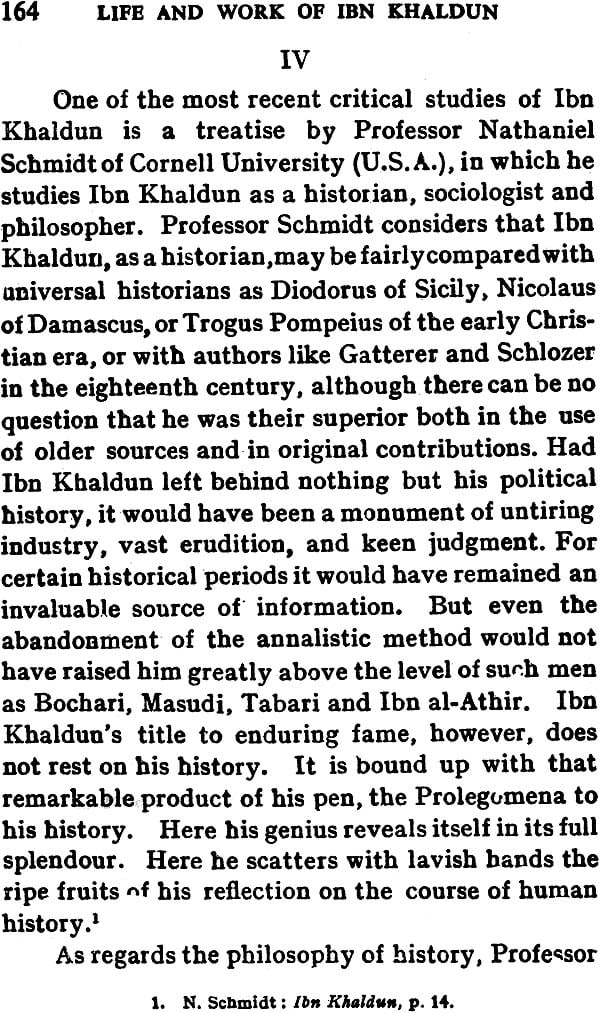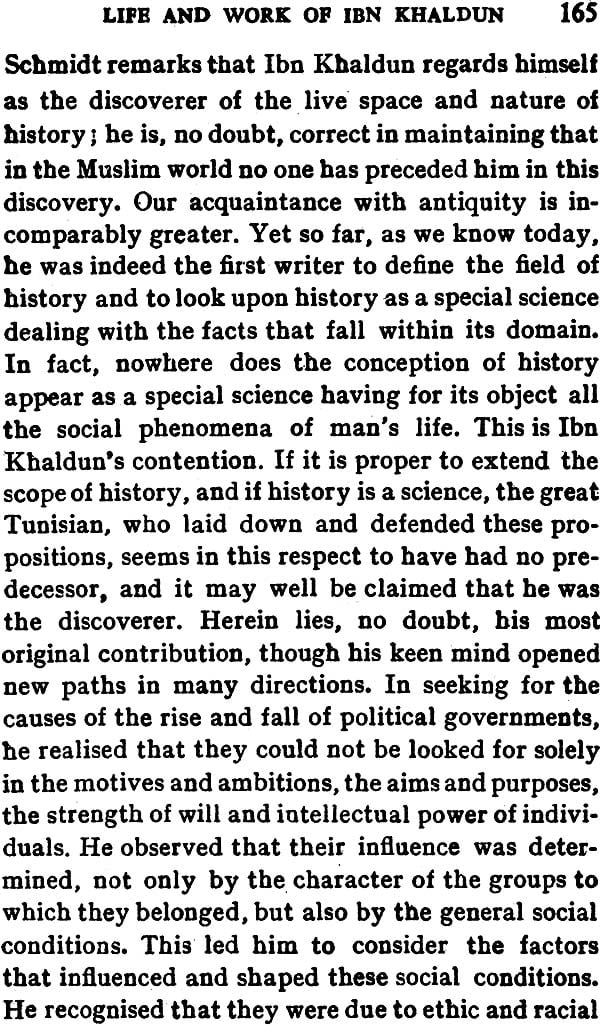
Ibn Khaldun (His Life and works)
Book Specification
| Item Code: | NAJ356 |
| Author: | Mohammad Abdullah Enan |
| Publisher: | Kitab Bhavan |
| Language: | English |
| Edition: | 2011 |
| ISBN: | 817151054X |
| Pages: | 202 |
| Cover: | Hardcover |
| Other Details | 8.5 inch X 5.5 inch |
| Weight | 350 gm |
Book Description
Foreword
The intellectual legacy of Ibn Khaldun is unique among the works of Muslim thought and, not with Standing the lapse of centuries, still maintains its value, vigour and modernity, and occupies a high place among the monuments of world thought. But Ibn Khaldun, whom the West discovered and, for more than a century, studied, criticised and analysed, is not fully appreciated in the East, his memory is forgotten and his legacy is cast into oblivion. While in the West various books and critical studies have been written about the man and his work, there has almost been nothing of the sort in the East, his home and the owner of his patrimony.
It is gratifying to note, however, that Ibn Kbaldun has lately been spoken of and an appeal made to revive his memory on the occasion of the six hundredth’ anniversary of his birth. Intellectual and literary circles in all the Arabic-speaking countries responded to this generous appeal, several meetings were held to evoke his memory and his immortal works, particularly in Tunis, his birthplace and tile cradle of his fame, and in Egypt, the home of his old age and his last resting place. The Arabic press was for some time busy with publishing studies about him, thus vividly evoking his memory and directing attention to his legacy. As Ibn Khaldun Was foremost among the Muslim thinkers, r knew and studied him in my younger days. He deeply impressed me as being the fore- most among the historians whose comprehension of history, its value and criticism, I greatly admired. This study, which I present to introduce Ibn Khaldun and his legacy, is a token of the gratitude of a disciple to his master. The six hundredth anniversary of the birth of the great historian and philosopher was the right occasion for writing this study.
I have carefully followed the life of Ibn Khaldun closely and have explained the political events in which he took part and with which he was connected. As his life formed part of the history of the Berber states in the middle of the eighth century A.H., I have dealt at greater length on the-history of these states and the changes which took place in them at that time, and have tried to explain their political institutions. Likewise I have taken great interest in the life of Ibn Khaldun in Egypt, and dealt at great length with it, explaining the relations of the historian with the intellectual Egyptian society, and the controversy between him and the Egyptian writers.
As for the legacy of Ibn Khaldun, I propose to give a simple exposition and to avoid polemics and complicated comparisons, being careful at the same time to review points of interest and useful discussion. My object is to present in a clear, concise manner the legacy of Ibn Khaldun to cultured youth, so that when they understand and appreciate it they can take up Ibn Khaldun’s work, read and study it carefully and fully. As for the study of Western research of Ibn Khaldun, and its appreciation, analysis and comparison of his thought and theories, I have reserved a special chapter giving a complete purport of all that has been written on the subject.
I have likewise given a bibliographical note of Kitab al-Ibar showing the phases through which it passed till it was completely published, the manuscripts consulted, the parts translated into European languages, and the manuscript copies of it in the various libraries. This is followed by a detailed bibliography of all the Arabic and Western sources I consulted, in which Ibn Khaldun and his legacy are studied, to be read by those who wish to go deeper into the subject.
Although an ancient thinker, Ibn Khaldun should be a master to the youth of Arabic and Islamic world, and his Prolegomena should be often read by them, not only to admire his marvellous thought and research, but also to learn from it the methods of expression of many social theories, which otherwise are difficult to express, because if the Prolegomena of Ibn Khaldun is an inestimable wealth in the intellectual legacy of Arabic literature, it is also an inestimable wealth of Arabic rhetoric.
I present to the cultured youth in all Arabic and Muslim countries this study of a distinguished personality in the history of Muslim thought, a great original spirit who anticipated the West in laying down the principles of sociology and is still the object of admiration and appreciation by Western research, hoping that the youth will find in this study an incentive to read, understand and profit by the valuable legacy of Ibn Khaldun.
Contents
| Book I | ||
| The Life of Ibn khaldun | ||
| Part I | ||
| In North Africa and Andalusia | ||
| Chapter i. | The Early Life of Ibn Khaldun | 1 |
| Chapter ii. | Ibn Khaldun at the Court of Fez | 11 |
| Chapter iii. | The Journey to Andalusia | 28 |
| Chapter iv | The Zenith of Adventure | 36 |
| Chapter v. | Retirement and Literary Work | 50 |
| Part II | ||
| Ibn Khaldun in Egypt | ||
| Chapter vi. | The Lecturer and the Judge | 63 |
| Chapter vii. | In Damascus and in the Camp of Timur | 78 |
| Chapter viii. | Ibn Kbaldun and Egyptian Thought | 91 |
| Book II | ||
| The Intellectual and Social Legacy of Ibn Khaldun | ||
| Chapter i. | Sociology as Exposed by Ibn Kbaldun | 109 |
| Chapter ii. | The Science of Politics and Monarchical Institutions before Ibn Khaldun | 121 |
| Chapter iii. | “Kitab al-Ibar” and “Al•Taarif” | 134 |
| Chapter iv | Ibn Khaldun and Modern Criticism | 150 |
| Chapter v. | Ibn Khaldun and Machiavelli | 168 |
| Appendix | Bibliographic Review of Ibn Khildun’s Historical Work “Kitab al-Ibar” | 183 |
| Bibliography |
